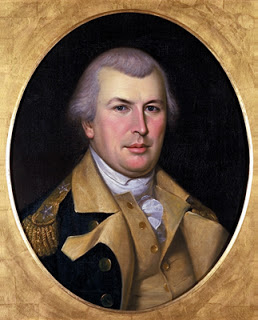Clever like a crab
By Al R. Young
 |
| Nathanael Greene
by Charles Wilson Peale, 1783 |
General Nathanael Greene, the brilliant commander of colonial forces in the south during the closing years of America's War for Independence, used retreat as a road to victory.
His strategy actually made an ally of the earth itself, enlisting in his cause the topography, climate, vegetation, and other natural features of the countryside. Of his strategy for defeating the forces of Cornwallis, Greene wrote: "I run as fast backwards as forwards, to convince our enemy that we are like a crab. We can run in any direction, as long as it is away."
Pursuing Greene imposed a terrible toll upon his opponent, far more than would have been the case had Greene engaged his opponent in the traditional manner. And when Greene did engage, the British paid dearly for victory, so dearly that the victory was hollow.
Greene was not sidetracked by the desire to appear to be winning the war. Undoubtedly, many armchair generals would have volunteered advice, much of it ostensibly well meant, but all of it calculated primarily on alleviating armchair anxiety.
Instead of being diverted by such pressures, Greene remained focused not only on his objective, but the only way he could achieve it -- given the impossibility of his circumstances.
A battle-seasoned sergeant once explained the principle this way, when talking to a group of trainees: "The main thing is to keep the main thing the main thing. Otherwise, you die!"
Tags: 2012, Inspiration and creativity
Browse articles by year: 2025 . 2024 . 2023 . 2022 . 2021 . 2020 . 2019 . 2018 . 2017 . 2016 . 2015 . 2014 . 2013 . 2012 . 2011 . 2010 . 2009 . 2008 . 2007 . 2006 . 2005 . 2004 . 2003 . 2002 . 2001 . 2000 . 1999 . 1998 . 1997 . 1996
Browse articles by topic: Art lessons . BenHaven Archives . Blank art diaries . Fine art photography . Framing . Illustration . Inspiration and creativity . Isles of Rune . Limited Editions Collection . My Fathers Captivity . News . Novellas . Oil paintings and prints . Operations announcements . Orders and shipping . Overview . Portfolios . The Papers of Seymore Wainscott . Project commentaries . Recipes by Nancy Young . Recommended reading . Recommended viewing . Temple artworks . The Storybook Home Journal . Tips and techniques . Tools supplies and operations
Browse articles by topic: Art lessons . BenHaven Archives . Blank art diaries . Fine art photography . Framing . Illustration . Inspiration and creativity . Isles of Rune . Limited Editions Collection . My Fathers Captivity . News . Novellas . Oil paintings and prints . Operations announcements . Orders and shipping . Overview . Portfolios . The Papers of Seymore Wainscott . Project commentaries . Recipes by Nancy Young . Recommended reading . Recommended viewing . Temple artworks . The Storybook Home Journal . Tips and techniques . Tools supplies and operations